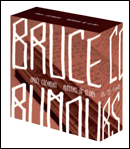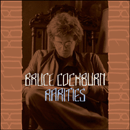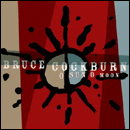Accept the gift of circumstance
No more careful stepping plans
Everything holds out its hand
Gonna hold you up and love you
Gonna hold you up and love you
Waterwalker
Water under, sky above
Creation as metaphor for love
Shed resistance like a worn out glove
Gonna hold you up and love you
Gonna hold you up and love you
Waterwalker
Got no power, got no fear
Anyone can do it can't you hear
River crying loud and clear
Gonna hold you up and love you
Gonna hold you up and love you
Waterwalker
Musicians
Hugh Marsh: Violin, Drum Programming
Bruce Cockburn: Guitar, Drum Programming, Vocal
Production
Produced by Bruce Cockburn and Hugh Marsh
Editor's Note - "Waterwalker" is from the soundtrack album of film of the same name. Waterwalker is a film by and about Canadian canoist/artist Bill Mason featuring beautiful cinematography of the Great Lakes region. Bruce composed the title song and about 32 minutes of instrumental music with Hugh Marsh.
2022: Re-released on digital album Rarities
2023: Re-released on vinyl version of O Sun O Moon
Known comments by Bruce Cockburn about this song, by date:
*1996(?) - [On a hunch that contemporary popular music might fit the bill, and urged on by Alan Whatmough, Sutherland got in touch with singer Bruce Cockburn, who liked the idea of working on a Bill Mason film, and eventually teamed up with musician Hugh Marsh to compose and record the musical score for Waterwalker. As an Ottawa boy, Cockburn had chummed around with one of Budge and Judy Crawley's sons and had met Bill either through that connection or through a visit on Hockey Film Night at the Masons during a short stint as a youth leader at St. Paul's Church in Ottawa. Cockburn later recalled that first meeting with some regret, saying:]
"I think it was back when he was doing the wolf movie Cry Of The Wild. It was way back. I was introduced to him, and I sort of thought he was a crackpot. I didn't pay much attention, you know, because I had my own attitude at the time. Later, when I saw the movie, I regretted that I'd been hasty with him because the movie was absolutely beautiful. Here's a guy who doesn't just make a movie about wolves, he goes off and lives with them. And gets intimate with them. And its not your basic Animal Kingdom or Walt Disney nature movie. It doesn't pull punches. There's heart in it. You feel his love of his subject throught the film, which is something you may find in dramatic films but not very often in documentaries. The film was full of passion."
[Trust on Bill's part for this musical decision made by Wilber allowed him to enter into the creative process- at least in so far as it was possible for a strong-willed creator like him to do so- with Cockburn and Marsh, even though music was one of the few aspects of film making about which Bill Knew next to nothing. Cockburn and Marsh set up in a little studio in Toronto, designed for recording advertising jingles, and began improvising to the Waterwalker visuals. Bill watched in awe. Intuitively he knew the feel he was hoping to give his audience and, musically, given the subject of wilderness, he knew that emotion could be achieved, and had been achieved in earlier films (and in his slide show) with simple voyageur songs and basic guitar chords. Sutherland knew that Waterwalker needed more than this and laboured to convey the point to Bill. Cockburn remembers Bill having a very clear idea about what he wanted, but failing almost every time in efforts to describe how this might be achieved. Cockburn described the collaborative process:]
"He was very particular, even though he didn't know anything about music at all. He would communicate clearly what he felt about things, and he was not shy about doing that. But he could be persuaded too. I found him very enjoyable to work with. I've worked with other film makers at different times; some of them are plain pig-headed. Mason did have to go through the process of weeding and refining and so we worked on the music for a long time. But invariably when we'd play a musical idea, he'd get excited, even though most of the ideas we came up with were generally beyond his comprehension and outside his understanding of music... There was one area where he didn't agree with what we wanted to do musically, and I remember having to persuade him on one occasion that this was a good way to go. And I seem to remember there being something that he didn't really like. But we worked it out. I mean, generally, there was some discussion over how much music should be in it, and he wanted lots of music, and it was generally felt - I felt, and Wilber maybe felt too- at a certain point it starts to seem absurd to have so much music in a movie. There was some concern that if you had to have that much music to carry the movie, then there was something wrong with the movie. But in the end I don't think that was a problem."
[The final mix-down of the Waterwalker soundtrack, done in Dolby stereo to play in bif theatres, was completed in the spring of 1985. That summer, while Wilber was arranging the promotion and launch of the film for late October, Mason joined Alan Whatmough, Cockburn, Wally Schaber and two other canoeists on the Hood River, the third north of the 60th parallel he had paddled in his life, generating stories that would later be told in Wild Waters, a book about Canadian rivers to which Bill had contributed, and in his second how-to canoe book, entitled Song Of The Paddle. One story from that trip, never told by Bill, that conveys Bill's child-like exuberance for life in spite of all the hassles with Waterwalker, was remembered by Bruce Cockburn in thinking back on the Barren Lands trip. Soon after they landed to begin the trip, Mason galloped up the steep side of an esker, a long sandy hill laid down by a river flowing beneath a receding glacier. Standing on top of the esker, in command of an endless view across the rolling tundra of the Hood River valley, Bill tipped back his head and let out a long, mournful howl, to be greeted only by the whispers of arctic silence. The shoulders dropped, and crestfallen with disappointment at not raising a chorus of arctic wolves, he kicked stiff-legged down the esker, hands pocketed.] - from "Fire In The Bones", by James Raffan, 1996(?). Submitted by Rob Caldwell.
Help out! To add material to this section, see this page first.
Song Index | Alphabetical Song Index | Chronological Song Index
This page is part of The Cockburn Project, a unique website that exists to document the work of Canadian singer-songwriter and musician Bruce Cockburn. The Project archives self-commentary by Cockburn on his songs and music, and supplements this core part of the website with news, tour dates, and other current information.





